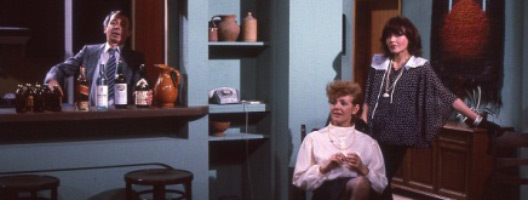TV intimacy and family dramas

Much as elsewhere in the world television programmes and modes of address in state socialist countries reflected the domestic viewing context. Television personalities and especially TV presenters often adopted an intimate mode of communication, addressing viewers in a direct, personalised manner. It is therefore little surprise that TV presenters became widely known and are often fondly remembered by viewers to this day.
Television fiction, especial serial dramas, also mirrored television’s domesticity. Broadcasters sought to create dramas set in the domestic sphere which would not only mirror the context in which programmes were being viewed, but create believable ‘ordinary’ characters who often differed significantly from the socialist realist-type ‘positive heroes’ found in literature and film. These serials had the intention not only of speaking to viewers’ everyday lives, but also to create a forum through which social and ethical issues could be discussed. In this respect, the personal was political.
Household Wars [Wojna Domowa, 1965] was the first ‘family series’ to be broadcast in Poland, and remains popular to this day. It follows the life of the residents of a communal apartment bloc in Warsaw and focuses on comic scenes of everyday life in and everyday squabbles. The main characters in the show are the Jankowski family and their neighbours. Based on a series of magazine articles in ‘Przekrój’ magazine portraying the social routines of Polish families, the lives of young adults and their leisure interests, the show depicted the experiences of Polish youth and their families. The plotlines centre upon generational relations, family life, as well as leisure time and consumption.
The Yugoslav sitcom Theatre in the House (Pozorište u kući, TVB Belgrade 1972-1984), likewise rebroadcast several times and fondly remembered to this day, also centres on everyday domestic life. Set in an apartment block of New Belgrade, a newly built part of the Yugoslav capital stretching over almost 2000 hectares, the series follows the daily life of the Petrović family and their neighbours. Much as the Polish Household Wars, the storylines revolve around comic incidents and offer telling insights into gender and generational relations at the time.